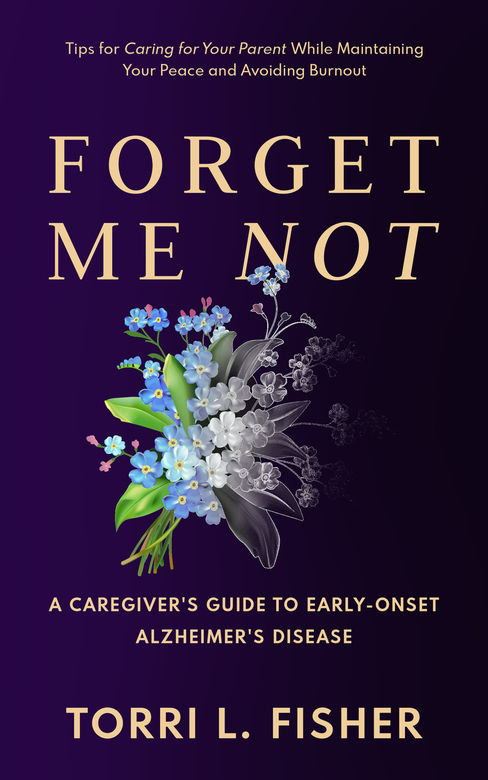
Teaching caregivers how to effectively serve someone with Alzheimer’s, while also caring for themselves, Torri L. Fisher’s Forget Me Not: A Caregiver’s Guide to Early-Onset Alzheimer’s Disease: Tips for Caring for Your Parent While Maintaining Your Peace and Avoiding Burnout is indispensable reading for those going down the path of chronic illness with a loved one.
Beginning with the basics of dementia and Alzheimer’s, the opening chapters are general introductions to these afflictions, including the range of their symptoms, which may help caregivers recognize any advancements in the loved one’s condition. This leads naturally into the basics of caregiving, what you should expect and what you will likely have to do, as well as the behaviors to avoid.
When it comes to Alzheimer’s, particularly early or rapid onset, tips to avoid conflict, frustrations, and hurt feelings are critical. Information on dietary structure, personal scheduling, needs-monitoring, and communication strategies are both thorough and concise, shared in Fisher’s accessible, compassionate, and relatable voice.
One of the most helpful aspects of this guide is Fisher’s suggestion for interaction with the legal and medical professionals that will likely be involved in the care of someone with Alzheimer’s or dementia – an often overlooked element of caregiving. Being an advocate for someone who is struggling to speak, recollect, critically think, or logically process information means stepping into situations and making tough decisions on their behalf. Understanding some of the common obstacles that will arise, as well as some of the jargon you’re likely to hear in lawyer’s offices and Alzheimer’s wards, is an enormously useful contribution of this guide.
The second half of the book steps away from the complex logistics of illness, details of Alzheimer’s itself, and formal considerations you should take as a caregiver. Instead, these later sections address the emotional toll that caring for someone with a chronic illness can take, as well as tips for managing that burden. Boundary-setting advice and self-care techniques, as well as anecdotal stories from the author’s experience with her own mother, provide a variety of tools and coping strategies that will undoubtedly come in handy.
Chapters 7 and 8 present some optimistic new treatment areas and methodologies that have proven successful, offering some degree of hope – a core tenet of the book, as it offers a kind of comforting hand through the process. The suggested activities for spending time with your loved one, from reconnecting and finding joy to reinforcing memories and building cognitive strength, are indicative of the help offered throughout, as Fisher presents valuable pieces of advice for anyone shouldering such a caretaking or palliative role.
From a technical standpoint, the book is intuitively structured and ordered well, moving from the basics to the more complex and nuanced elements of caregiving. Some of the image choices are a bit basic, reminiscent of clip art in a school paper. Occasionally, the tone is a bit too casual for the subject, but on the whole it is varied and engaging – authoritative when talking about technical details, and vulnerable when discussing personal experiences.
Overall, Forget Me Not is an eye-opening and essential guide for caregivers that is functional, comforting, honest, and empowering.
Book Links
STAR RATING
Design
Content
Editing
Get an Editorial Review | Get Amazon Sales & Reviews | Get Edited | Get Beta Readers | Enter the SPR Book Awards | Other Marketing Services























Leave A Comment